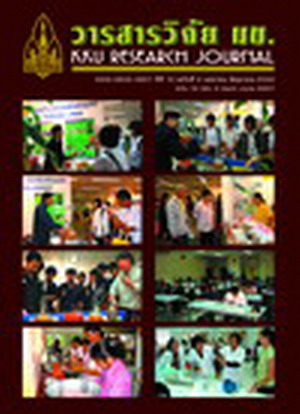Factors affecting the activity of Arylamine N-Acetyltransferase from biliary epithelial cell lines (Thai)
Main Article Content
Abstract
Arylamine N-acetyltransferase1 is a phase 2 drug metabolizing enzymes responsible for the metabolism of drugs, foreign and toxic chemicals, especially carcinogenic compounds of aromatic and heterocyclic amines found in food. Previous reports revealed an association between the polymorphism of the NAT1 gene and cancer risk. In addition, there is also an established association between inflammation of the biliary duct and cholangiocarcinogenesis. Our study aimed to determine the effect of inflammation on the activity of NAT1 using the pro-inflammatory cytokines (interferon-γ, interleukin-1β and tumor necrotic factor-α). Results show that NAT1 enzymes from the 4 biliary epithelial cell lines exhibit the same kinetics properties, i.e. similar Km value, whereas, Vmax is the highest for enzyme from KMBC and lower in the following order, KKU-M214, KKU-100 and KKU-OCA17. Treatment with pro-inflammatory cytokine combination to cell cultures for 48 hr resulted in decrease of NAT1 activity in comparison with control cells, (p<0.05). Moreover, the treatment cells were found to release nitric oxide into the culture media. It was concluded that inflammation elicited on biliary cells results in suppression of NAT1 activity and may be related to oxidative stress and nitric oxide formation.


